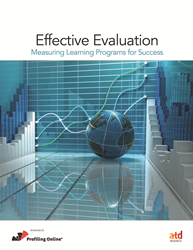
“Being able to attribute achievement to the effects of a learning program is challenging, particularly when there are several variables present such as economic conditions, sales incentives, or new products and services.” —Kristopher Newbauer, Rotary International.
ALEXANDRIA, Va. (PRWEB)
December 03, 2019
Making the business case for training and development is critical to preserving training budgets, but it remains a challenge for many organizations. According to new research from the Association for Talent Development (ATD), 40 percent of training professionals believe their organization’s evaluation efforts are effective in meeting business goals, and not many more, 50 percent, believe their efforts are meeting learning goals. These findings are just a few of many in ATD’s Effective Evaluation: Measuring Learning Programs for Success.
Investment in employee development is on the rise—ATD’s 2018 State of the Industry report finds that learning expenditure per employee has increased for the last six consecutive years—so proving that these expenditures are paying off and strategic learning and business goals are being accomplished is critical in today’s workplace. The data in this report shows that there is a strong need for organizations to improve the effectiveness of their evaluation efforts.
“Being able to attribute achievement to the effects of a learning program is challenging, particularly when there are several compounding variables present such as economic conditions, sales incentives, or new products and services,” says Kristopher Newbauer, chief human resources officer and head of global people and talent at Rotary International. He is quoted in the research report.
Key findings from the Effective Evaluation report, sponsored by Profiling Online, are:
- The top barriers to conducting learning evaluations were the difficulty of isolating the effects of learning programs, a lack of access to the data talent development professionals need to conduct higher level evaluations, and the costs of conducting higher level evaluations.
- Less than half of organizations (43 percent) use big data (extremely large datasets that may be too large or complex for traditional data software to handle) as a data source for evaluations. Some of the most common challenges organizations face when managing big data are communicating findings from data and analyzing data.
“Organizations that value evaluation are much more likely to attract and retain employees with evaluation skills,” says Rotary’s Newbauer. “To the extent that evaluation work is taken seriously and used with good intention for improvement, their work feels more meaningful. And meaningful work is critically important to engagement and retention.”
To learn more about the research findings and the challenges that organizations are experiencing when evaluating development programs, access the full research report at http://www.td.org/evaluationreport.
About ATD
The Association for Talent Development (ATD) is the world’s largest professional membership organization supporting those who develop the knowledge and skills of employees, improve performance, and help to achieve results for the organizations they serve. Originally established in 1943, the association was previously known as the American Society for Training & Development (ASTD).
For more information, visit http://www.td.org.
Share article on social media or email:

